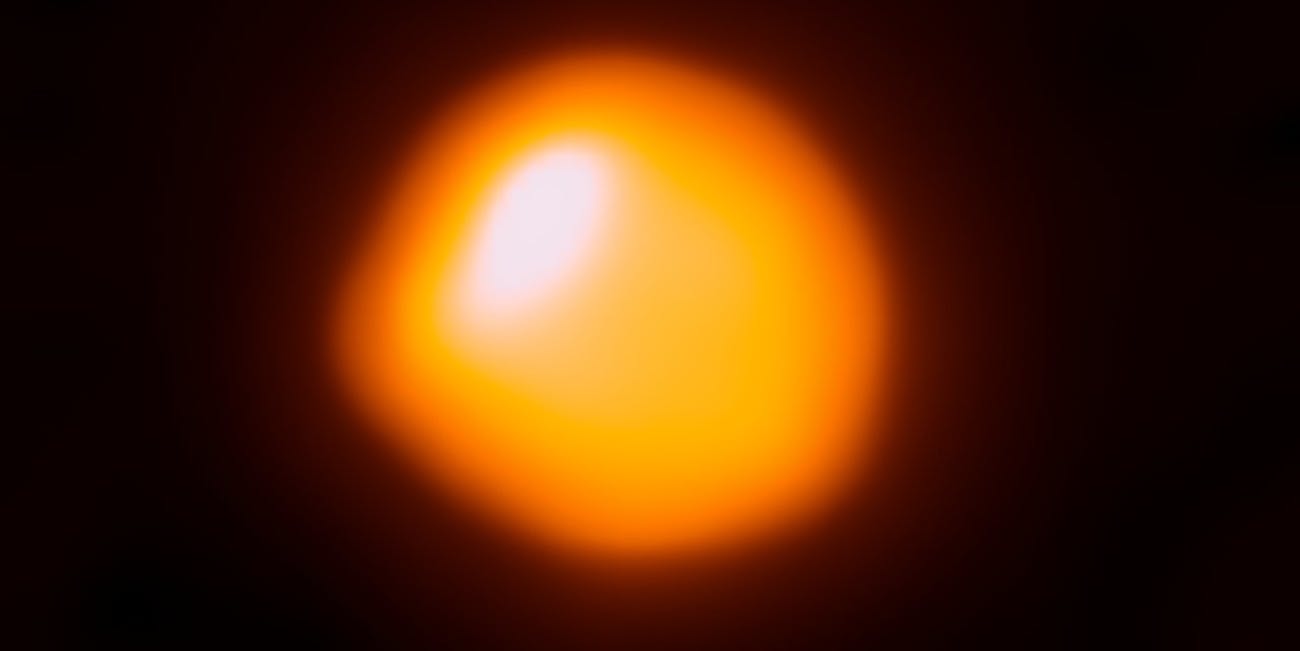
Huge red star might explode soon and next few weeks are critical
https://www.cnet.com/news/huge-red-star-might-explode-soon-and-next-few-weeks-are-critical/
Betelgeuse has been very volatile lately, and astronomers are watching to determine if it's terminal or just going through a phase.
Supergiant star Betelgeuse has been getting dimmer at an unprecedented pace over the past few months, leading some astronomers to wonder if it might be in the process of the collapse that precedes a supernova explosion. But there are other possible explanations, and we should have a better idea of what's happening to the massive star by the end of the month.
Veteran Villanova University astronomer Edward Guinan has been watching Betelgeuse for decades and reported earlier this month that the star appears to be "the least luminous and coolest yet measured from our 25 years of photometry."
It's well known Betelgeuse has no more than about 100,000 years left to burn and could start its death throes just about anytime between now and then. When it does go supernova, it's expected to result in a dramatic light show that could be visible in daylight and appear brighter than the full moon for a few weeks. The last time humans were treated to such a sight was the 17th century.
But as astronomer Tony Phillips points out on Spaceweather.com, the sudden fainting of Betelgeuse could also have less catastrophic explanations like a giant sunspot or clouds of stellar dust.
Perhaps the most boring explanation of all is that the star is just doing its thing. See, Betelgeuse is a well-known variable star that pulsates over a variety of time periods.
"This whole episode might just be a deeper-than-average pulsation, and perhaps the supernova watch can be called off," Phillips writes.
The most recent data from Guinan's team shows that Betelgeuse could be going through an extended 430-day pulsation. If this is the case, it should reach its dimmest point on Feb. 21 (with a margin of error of about a week on either side).
However, Guinan and colleagues note that Betelgeuse still appears to be even dimmer than it should be during such an extended pulsation. This could mean that there are multiple factors at work in the great fainting of the giant star.
"So something very unusual is going on," Guinan says.
Whatever it is, astronomers will be watching closely to see if Betelgeuse finally begins to brighten in the next few weeks. If not, the supernova watch is likely to continue.
~~~~~~~
Massive star Betelgeuse continues to act weird on an unprecedented scale
Just a few months ago it was 2.5 times brighter, which means it could be thrashing around preparing to explode.
Eric Mack
February 3, 2020
Betelgeuse is a gigantic red supergiant star that was the 10th brightest star in the sky as recently as 2019. But over the past few months it has dimmed so dramatically it's now ranked 24th, and it has astronomers wondering if it might be ready to burst in a spectacular supernova explosion.
Edward Guinan and other astronomers from Villanova University shared a brief update on Betelgeuse over the weekend, reporting it's now about one full magnitude fainter than it was in September. Magnitude is the scale of brightness astronomers assign to objects in the night sky. Put another way, this change in scale means that Betelgeuse was about 2.5 times brighter in September than it is right now.
"The most recent photometric observations indicate that Betelgeuse is currently the least luminous and coolest yet measured from our 25 years of photometry," the astronomers write.
Betelgeuse is nearing the end of its life. It's expected to go supernova sometime in the next 100,000 years by first shrinking and collapsing in on itself before rebounding in a remarkable explosion that could be brighter than the moon and even visible during daylight. It's possible we're seeing the start of those death throes now. Or it could be something else.
"Whether Betelgeuse is shrinking, dimmed by a giant sunspot, shrouded in an outburst of stardust, or about to explode, is anyone's guess," astronomer Tony Phillips writes on his site, Spaceweather.com.
The latest observations of Betelgeuse indicate that the dimming seems to be slowing, but astronomers are sure to keep a close eye on it in the coming weeks. For the rest of us, because this is 2020 we can keep an eye on the superstar's status by following the numerous (and often humorous) Betelgeuse Twitter accounts that have popped up.
















